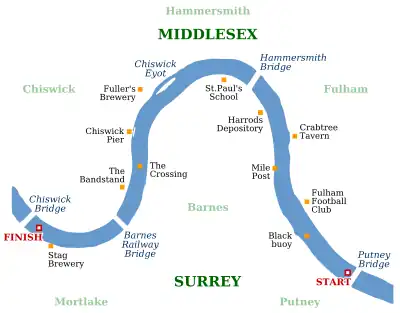| 30th Boat Race | |||
|---|---|---|---|
| Date | 29 March 1873 | ||
| Winner | Cambridge | ||
| Margin of victory | 3 lengths | ||
| Winning time | 19 minutes 35 seconds | ||
| Overall record (Cambridge–Oxford) | 14–16 | ||
| Umpire | Joseph William Chitty (Oxford) | ||
| |||
The 30th Boat Race took place on the 29 March 1873. The Boat Race is an annual side-by-side rowing race between crews from the Universities of Oxford and Cambridge along the River Thames. In a race umpired by former Oxford rower Joseph William Chitty, Cambridge won by three lengths in a time of 19 minutes and 35 seconds, the fastest time in the history of the event. It was the first time that rowers raced on sliding seats.
Background

The Boat Race is a side-by-side rowing competition between the University of Oxford (sometimes referred to as the "Dark Blues")[1] and the University of Cambridge (sometimes referred to as the "Light Blues").[1] The race was first held in 1829, and since 1845 has taken place on the 4.2-mile (6.8 km) Championship Course on the River Thames in southwest London.[2][3] Cambridge went into the race as reigning champions, having defeated Oxford by two lengths in the previous year's race, while Oxford led overall with sixteen wins to Cambridge's thirteen.[4]
Although the use of sliding seats had been considered the previous year, the then-Cambridge boat club president John Goldie disallowed the Light Blue boat manufacturer Harry Clasper from fitting them.[5] However, for the 1873 race, both boats were, for the first time, fitted with the innovation.[6]
Cambridge were coached by John Graham Chambers (who rowed for Cambridge in the 1862 and 1863 races, and was non-rowing boat club president for the 1865 race).[7] Oxford's coach was Robert Lesley, the non-rowing president of Oxford University Boat Club (who had rowed in the 1871 and 1872 races).[8]
Joseph William Chitty (who had rowed for Oxford twice in 1849 (in the March and December races) and the 1852 race) returned as umpire for the race (with Robert Lewis-Lloyd having officiated the previous year)[5] while the starter was Edward Searle.[9]
Crews
The Cambridge crew weighed an average of 11 st 11 lb (74.7 kg), 5.25 pounds (2.4 kg) more than their opponents.[10] Oxford saw four former Blues return from the 1872 crew, while Cambridge's crew included three rowers who had participated the previous year, in James Brooks Close, Charles Stokes Read and Constantine William Benson.[6]
| Seat | Cambridge |
Oxford | ||||
|---|---|---|---|---|---|---|
| Name | College | Weight | Name | College | Weight | |
| Bow | J. B. Close | 1st Trinity | 11 st 3 lb | C. C. Knollys | Magdalen | 10 st 12.5 lb |
| 2 | E. Hoskyns | Jesus | 11 st 2 lb | J. B. Little | Christ Church | 10 st 13 lb |
| 3 | J. E. Peabody | 1st Trinity | 11 st 7 lb | M. G. Farrer | Brasenose | 12 st 4 lb |
| 4 | W. C. Lecky-Browne | Jesus | 12 st 1.5 lb | A. W. Nicholson | Magdalen | 12 st 9 lb |
| 5 | T. S. Turnbull | Trinity Hall | 12 st 12.5 lb | R. S. Mitchison | Pembroke | 12 st 7.5 lb |
| 6 | C. S. Read (P) | 1st Trinity | 12 st 13 lb | W. E. Sherwood | Christ Church | 11 st 1 lb |
| 7 | C. W. Benson | 3rd Trinity | 11 st 5 lb | J. A. Ormsby | Lincoln | 11 st 1.5 lb |
| Stroke | H. E. Rhodes | Jesus | 11 st 1.5 lb | F. T. Dowding | St John's | 11 st 0 lb |
| Cox | C. H. Candy | Gonville and Caius | 7 st 5 lb | G. E. Frewer | St John's | 7 st 6 lb |
| Source:[6] (P) – boat club president (Robert Lesley was a non-rowing president for Oxford)[11] | ||||||
Race

Oxford won the toss and elected to start from the Surrey station, handing the Middlesex side of the river to Cambridge.[6] The race commenced at 2.32 p.m. Oxford's higher stroke rate enabled them to make "a good race of it", and remained in contention for the first mile-and-a-half to Hammersmith Bridge, but in doing so exhausted themselves. Cambridge eased off and won the race by three lengths.[12] The winning time was 19 minutes and 35 seconds, the fastest time in the history of The Boat Race and 29 seconds faster than the previous record set in the 1869 race.[4]
References
Notes
- 1 2 "Dark Blues aim to punch above their weight". The Observer. 6 April 2003. Archived from the original on 11 September 2014. Retrieved 4 December 2014.
- ↑ Smith, Oliver (25 March 2014). "University Boat Race 2014: spectators' guide". The Daily Telegraph. Archived from the original on 1 July 2014. Retrieved 3 June 2014.
- ↑ "The Course". The Boat Race Company Limited. Archived from the original on 28 October 2014. Retrieved 4 December 2014.
- 1 2 "Boat Race – Results". The Boat Race Company Limited. Archived from the original on 12 July 2016. Retrieved 4 December 2014.
- 1 2 Drinkwater, p. 66
- 1 2 3 4 Burnell, p. 60
- ↑ Burnell, p. 104
- ↑ Burnell, pp. 110–111
- ↑ Burnell, pp. 49, 97
- ↑ Drinkwater, p. 67
- ↑ Burnell, pp. 50–51
- ↑ Drinkwater, pp. 66–67
Bibliography
- Burnell, Richard (1979). One Hundred and Fifty Years of the Oxford and Cambridge Boat Race. Precision Press. ISBN 0950063878.
- Dodd, Christopher (1983). The Oxford & Cambridge Boat Race. Stanley Paul. ISBN 0091513405.
- Drinkwater, G. C.; Sanders, T. R. B. (1929). The University Boat Race – Official Centenary History. Cassell & Company, Ltd.

